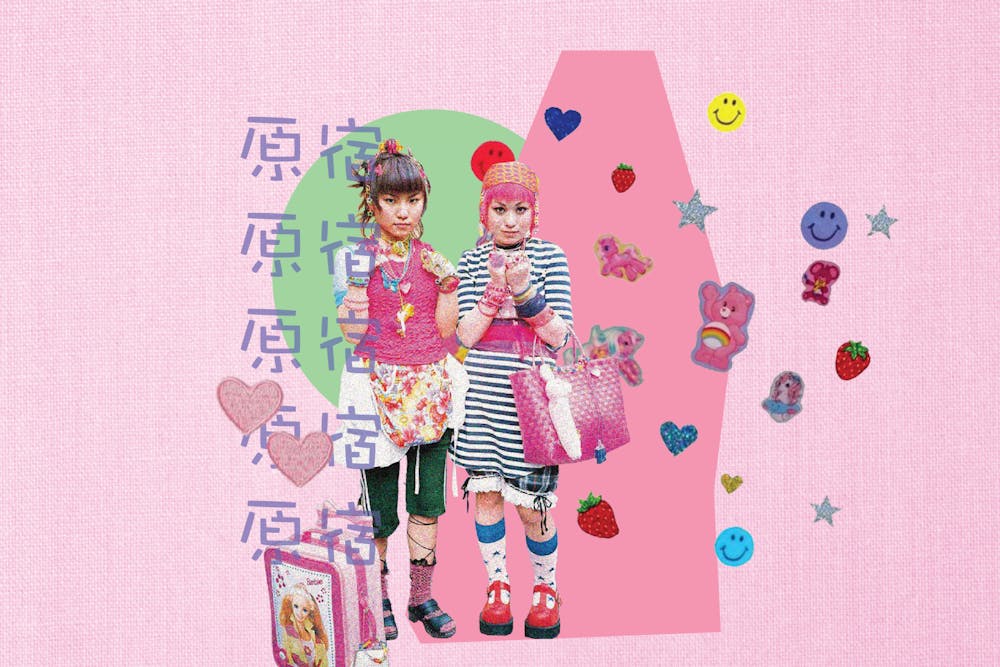Gwen Stefani is known for her iconic pop hits of the early 2000s—and also a slew of public controversies.
The list is nothing short of extensive: from bindis to Bantu knots, Stefani has had a longstanding history of cultural appropriation towards various marginalized communities. The pop star's solo debut in 2004 was particularly infamous. Popularly dubbed her “Harajuku Girls era,” Stefani was constantly seen accompanied by a group of four Japanese and Japanese American women. The Harajuku Girls were formally hired as back–up dancers for Stefani, but they were also used as aesthetic “accessories” for her public appearances—a “monolithic marvel” for the white American gaze. The women were often seen wearing identical outfits with bright geometric makeup and accessorized hair buns. Stefani herself wore contrasting outfits from the dancers, always placed in the middle of them in photos.
The Harajuku Girls—Maya Chino, Jennifer Kita, Rino Nakasone, and Mayuko Kitayama—were assigned the stage names “Love”, “Angel”, “Music”, and “Baby” after the title of Stefani’s first solo album, and reportedly, were contractually obligated to only speak Japanese in public. The dance troupe’s name and style were in reference to the neighborhood of Harajuku in Japan, a district well–known for its colorful street fashion. Stefani’s “deep fascination” with this particular area began at a young age when her father worked in Japan and brought home toys and stories of Japanese culture. Stefani was later able to monetize this “phase” in her career by creating a Harajuku Lovers clothing line, producing a children’s show called "Kuu Kuu Harajuku", and launching a Harajuku Mini collaboration with Target, amongst many other business ventures.
Like many other celebrities, Stefani recently defended her “Harajuku Girls era” through the narrative of cultural appreciation. In her speech for the Fashion Icon Award at the 2019 Peoples’ Choice Awards, she argued, "If we didn't allow each other to share our cultures, what would we be? You take pride in your culture and have traditions, and then you share them for new things to be created."
In many ways, the Harajuku Girls were a fulfillment of Stefani’s Asian pop culture fantasies—a manifestation of her intrigue for Japanese aesthetics. In an interview with Paper magazine, she shared, "I never got to have dancers with No Doubt ... I never got to do all of those fun girl things that I always love to do. So I had this idea that I would have a posse of girls—because I never got to hang with girls—and they would be Japanese, Harajuku girls, because those are the girls that I love. Those are my homies. That's where I would be if I had my dream come true, I could go live there and I could go hang out in Harajuku."

Stefani has also frequently lamented the cultural “restrictions” of modern social media. "I think that we grew up in a time where we didn't have so many rules. We didn't have to follow a narrative that was being edited for us through social media, we just had so much more freedom." While it may be true that Stefani has faced growing criticism in recent years over her culturally appropriative behavior, she fails to acknowledge how her career has remained relatively unscathed. She has been a coach for five seasons of the popular singing competition, The Voice, and has released multiple new singles in the past year. Gwen Stefani is still a millionaire—part of which is due to the profits from her Harajuku–inspired businesses—while Asian women are left to reckon with the consequences of her, and many other celebrities’ actions.
When Stefani first debuted the Harajuku Girls in the early 2000s, comedian Margaret Cho wrote a blog post expressing frustration with the racist stereotypes they represented. However, Cho also argued that the Harajuku Girls were at least “a measure of visibility, which is much better than invisibility.” She wrote further, “I am so sick of not existing, that I would settle for following any white person around with an umbrella just so I could say I was there.”
The continued lack of Asian representation in the media is frustrating, but rendering us hypervisible is not the solution we need. The Harajuku Girls themselves invoked public attention—but in what way, and at what cost?
Gwen Stefani was able to embark her solo career through the “exotic” shock factor of the Harajuku Girls, foreign “ornaments” that could ultimately be used to boost Stefani’s own public image. This pattern of objectification and fetishization of Asian women can have devastating consequences. For the six Asian women that were killed in Atlanta, and countless others who are disproportionately the victims of anti–Asian violence, hypervisibility is not safety; it is not something to be desired. The representation we need must acknowledge the diversity of our community and its own stories, not a fragment of it that is manipulated for white celebrities’ consumption.







